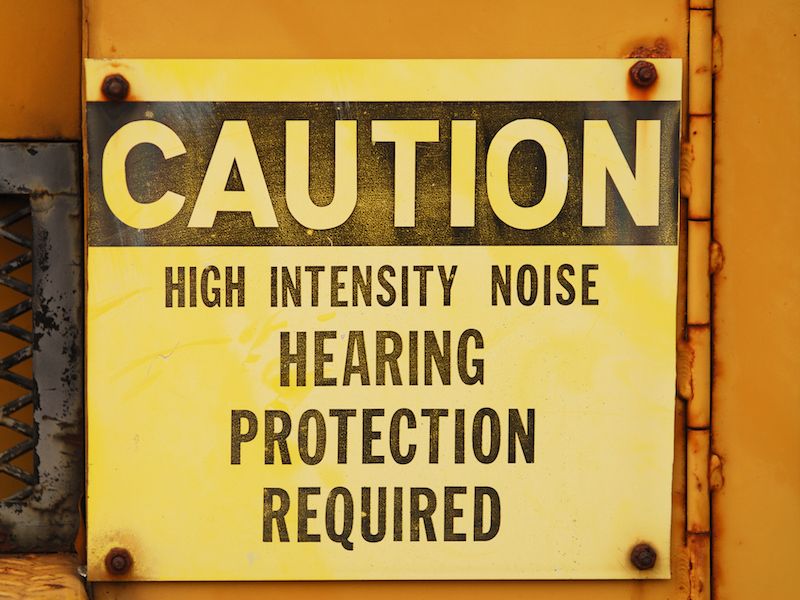
It’s one thing to recognize that you should safeguard your ears. It’s another matter to know when to safeguard your hearing. It’s not as straight forward as, for example, recognizing when to wear sunblock. (Is the sun out and are you going to be outside? Then you need sunscreen.) It’s not even as easy as knowing when to wear eye protection (Doing some hammering? Cutting some wood or working with hazardous chemicals? Use eye protection).
With regards to when to use hearing protection, there seems to be a big grey area which can be dangerous. Unless we have particular information that some place or activity is hazardous we tend to take the easy path which is to avoid the issue entirely.
Risk Evaluations
In general, we’re not very good at assessing risk, especially when it comes to something as intangible as long term hearing problems or hearing loss. Here are some examples to prove the point:
- A very loud rock concert is attended by person A. 3 hours is around how long the concert lasts.
- Person B runs a landscaping business. After mowing lawns all day, she goes home to quietly read a book.
- Person C works in an office.
You might think the hearing hazard is greater for person A (let’s just call her Ann). For the majority of the next day, her ears will still be ringing from the loud concert. It seems fair to assume that Ann’s activity was rather risky.
Person B (let’s call her Betty), on the other hand, is subjected to less noise. There’s no ringing in her ears. So her ears must be less hazardous, right? Not necessarily. Because Betty is mowing all day. The truth is, the damage builds up a little bit at a time despite the fact that they don’t ring out. If experienced every day, even moderately loud noises can have a damaging affect on your ears.
Person C (let’s call her Chris) is even less obvious. Lawnmowers come with instructions that emphasize the dangers of long-term exposure to noise. But while Chris works in a quiet office, she has a really noisy, hour-long commute every day on the train. Additionally, she sits at her desk and listens to music through earbuds. Is protection something she should consider?
When You Should be Concerned About Protecting Your Hearing
Generally speaking, you need to turn the volume down if you have to shout to be heard. And you really should think about wearing earmuffs or earplugs if your environment is that noisy.
So to put this a little more scientifically, you need to use 85dB as your cutoff. Noises above 85dB have the potential, over time, to cause injury, so in those situation, you need to think about using ear protection.
Your ears don’t have a built-in sound level meter to notify you when you get to that 85dB level, so most hearing specialists suggest downloading specialized apps for your phone. You will be capable of taking the correct steps to protect your hearing because these apps will inform you when the noise is approaching a harmful volume.
A Few Examples
Your phone might not be with you anywhere you go even if you do download the app. So a few examples of when to safeguard your ears might help you develop a good standard. Here we go:
- Listening to music with earbuds. OK, this doesn’t require protection but does require care. Pay attention to how loud the music is, how long you’re listening to it, and whether it’s going directly into your ears. Noise-canceling headphones are a smart choice to prevent having to turn the volume way up.
- Domestic Chores: We already talked about how something as simple as mowing the lawn, when done frequently, can require hearing protection. Cutting the grass is a good example of the sort of household task that may cause damage to your hearing but that you most likely won’t think about all that often.
- Driving & Commuting: Do you drive for Lyft or Uber? Or maybe you’re just waiting downtown for work or getting on the subway. The constant noise of city living, when experienced for between 6 and 8 hours every day, can cause injury to your ears over the long haul, specifically if you’re turning up your music to hear it over the din.
- Using Power Tools: You recognize you will require hearing protection if you work every day in a factory. But how about the hobbyist building in his garage? Even if it’s just a hobby, hearing specialists recommend wearing hearing protection if you’re using power equipment.
- Exercise: You know your morning cycling class? Or perhaps your daily elliptical session. Each of these examples might call for ear protection. The loud volume from trainers who play loud music and microphones for motivation, though it may be good for your heart rate, can be bad for your ears.
A good baseline may be established by these examples. When in doubt, however, you should choose protection. Compared to leaving your ears exposed to future injury, in most circumstances, it’s better to protect your ears. If you want to be able to hear tomorrow, protect today.
